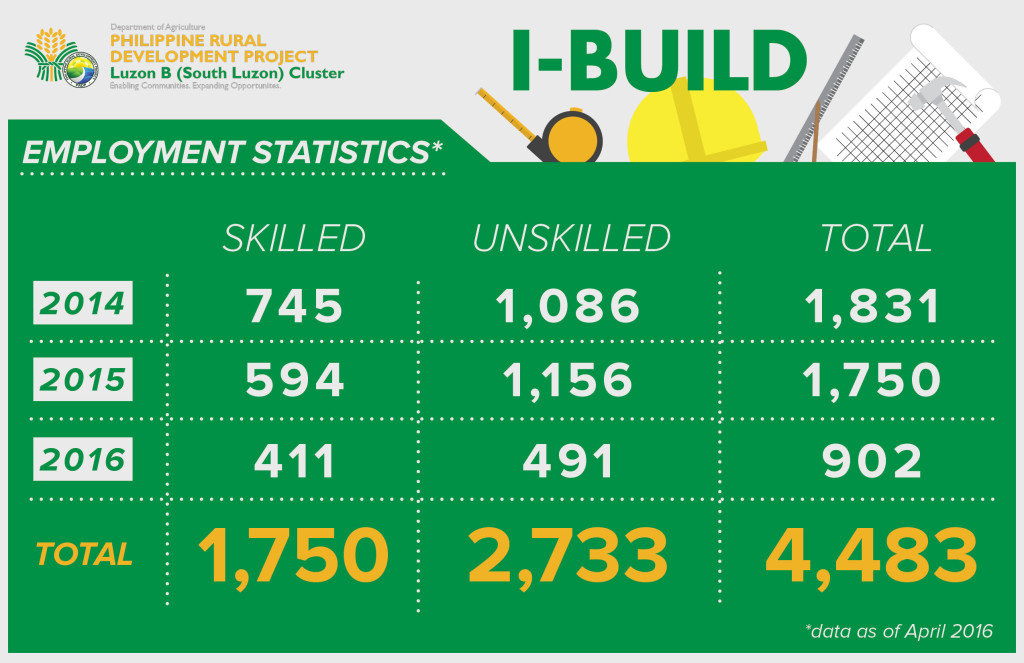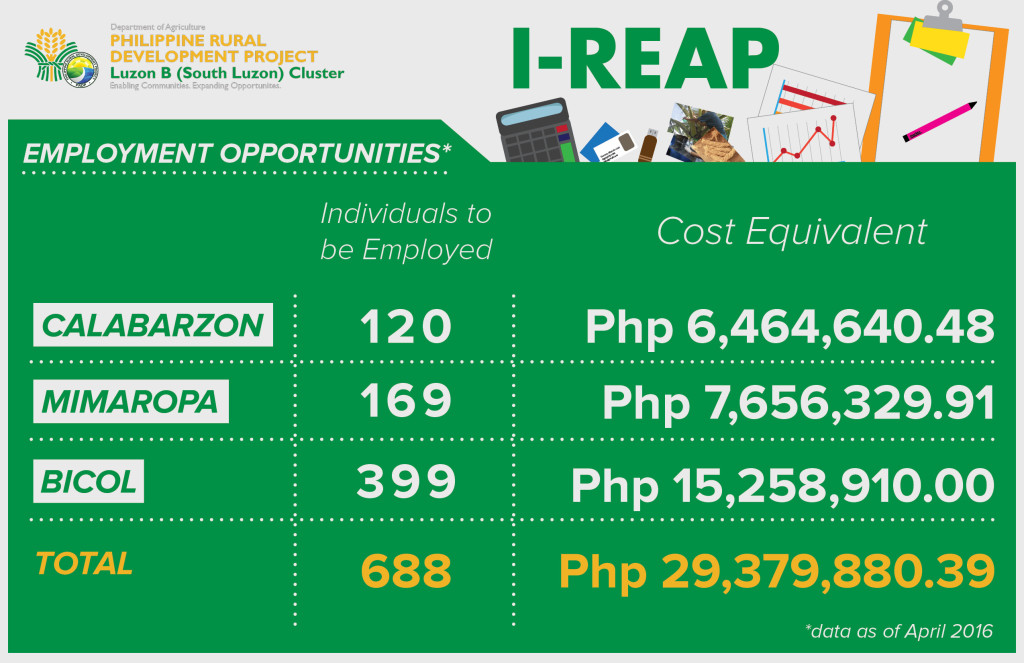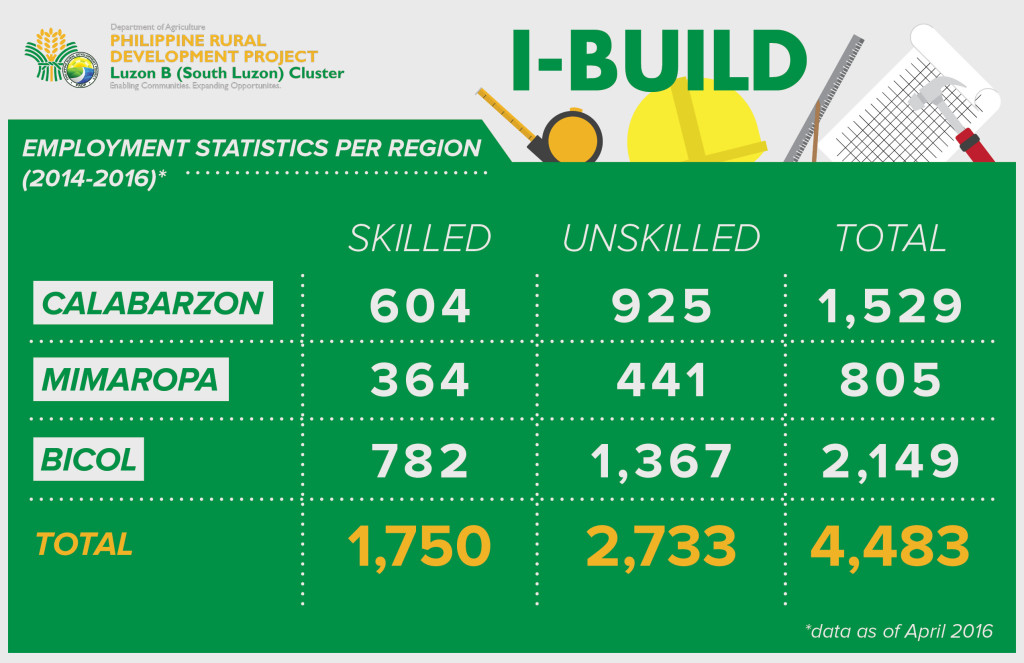
PRDP breeds employment opportunities in South Luzon
Employment opportunities are on the rise in South Luzon as the number of PRDP infrastructure and enterprise development sub-projects in the cluster increases.
With its tagline, “Enabling Communities, Expanding Opportunities,” PRDP opens the road not only for infrastructure and enterprise development. The Project also primarily aims to improve the livelihood and incomes of the people in the rural communities through the sub-projects it supports.
Since the start of PRDP in 2014, the South Luzon Cluster has provided at least 4,483 work opportunities from its I-BUILD or infrastructure development sub-projects. From the said number, 1,750 are technical or specialized work, while 2,733 are nontechnical or unskilled work.
“We would like to remain true to our tagline,” shared PRDP South Luzon Project Support Office (PSO) Director during the press conference for the recent World Bank implementation support mission.
PSO Director Shandy Hubilla further explained, “The payment for this loan from them [World Bank] is to see the development in the countryside through the fund they have provided. And we will be able to realize the intended benefits as early as two to three years from now.”
Based on the data of the PSO’s Economics Staff, the South Luzon Cluster’s I-REAP or enterprise development component will employ at least 688 individuals with an equivalent project cost of P29,379,880. About 399 will be employed in the Bicol Region, 169 in MIMAROPA and 120 in CALABARZON for the enterprise development sub-projects.
For the I-BUILD sub-projects, 2,149 are already employed in Bicol Region, 805 in MIMAROPA and 1,529 in CALABARZON.
“You don’t give somebody money without expecting something in return,” stated Douglas Forno, Institutional Specialist of the Food and Agriculture Organization during the recent World Bank mission.
The World Bank specialist also mentioned that the Bank would like to see a greater number of people in the communities, not only the proponent groups, to benefit from PRDP.
At this stage of PRDP implementation, employment and capacity-building opportunities are only some of the emerging project benefits.
“We want to attract more talents to be involved in agricultural enterprises and bring the pride back to the agriculture sector through innovations, skills development, and competitive pay that would most importantly contribute to the enterprises’ achievement of their socio-economic goals,” said Manolo Luis Herrera, PSO I-REAP Component Head.
PRDP trainings and workshops focus on the processes of project implementation such as preparation of Provincial Commodity Investment Plans (PCIPs), sub-project proposals, business plans, procurement plans and citizen monitoring among others.
Project stakeholders especially from the local government units (LGUs) also learn and experience how to use PRDP’s science-based tools such as geotagging, geomapping, Vulnerability and Suitability Assessment (VSA), and Expanded VSA (eVSA) during the said workshops. (Read more.)
According to Rey Lara, Head of the South Luzon I-PLAN Component, the Cluster goes beyond PRDP implementation by ensuring that priority programs and commodities contained in the PCIPs are operationalized and maximized instead of being locked in an office cabinet. PCIPs are intended to serve as the reference document for provincial planning and budgeting process.
Lara emphasized that strengthening partnerships with government institutions such as the Department of Agriculture bureaus and line agencies, Department of Science and Technology and Department of Trade and Industry and private funding institutions is necessary. With viable investors for the PCIP implementation, the number of funded projects will increase and employment opportunities will expand in the provinces.
After the Mindanao Cluster, South Luzon currently holds the biggest approved portfolio of infrastructure and enterprise development sub-projects amounting to P2.708 billion.
As a process-oriented project, PRDP engages other government institutions, LGUs, nongovernment organizations, agri-fishery sector and the other members of the community to become active participants and self-reliant partners in rural development. ### (Gumamela Celes Bejarin, DA-PRDP PSO South Luzon InfoACE Unit; Graphics by Ana Francesca Chavez, DA-PRDP PSO South Luzon InfoACE Unit)



